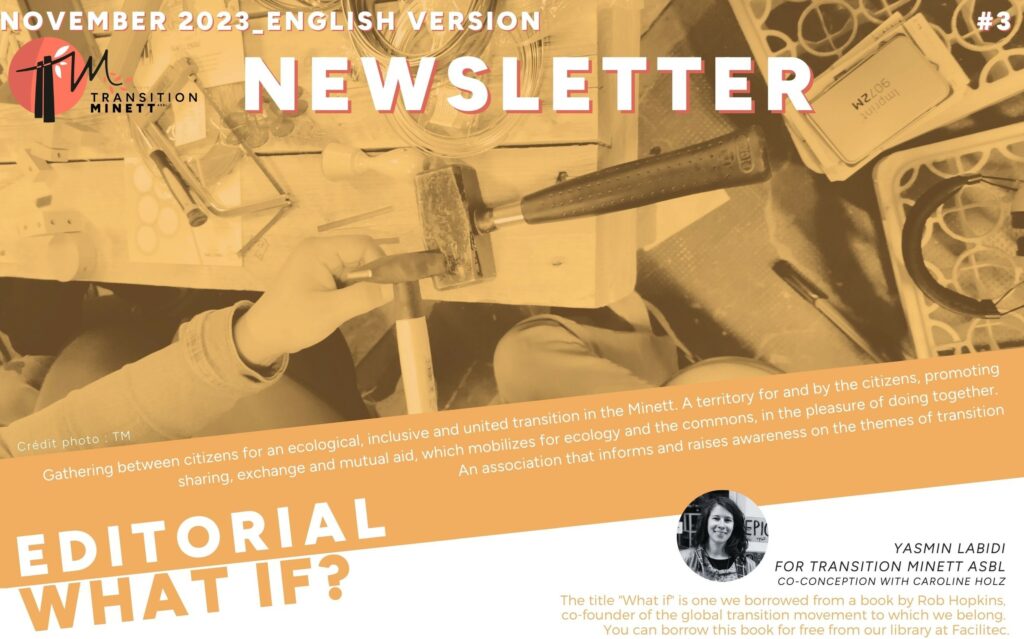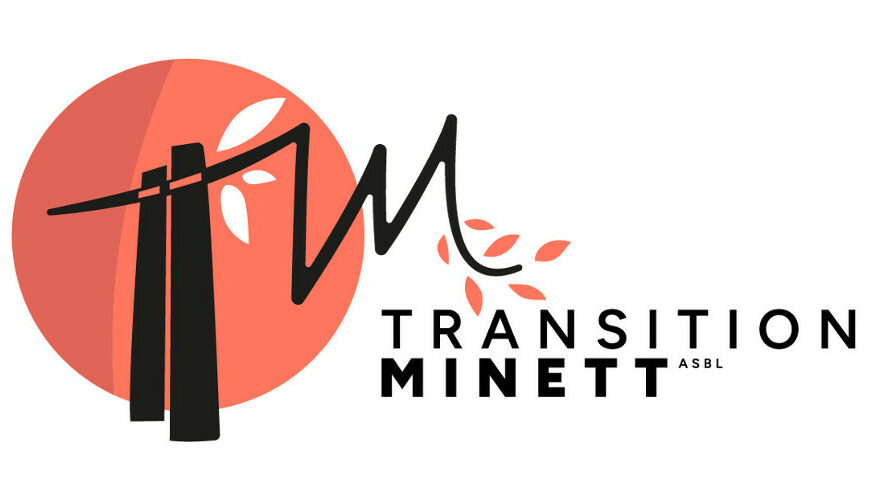Yasmin Labidi, for Transition Minett
in co-conception with Caroline Holz

Do you also drive to the office in the morning and find yourself in endless traffic jams, rush to grab a coffee and take the paper cup which is supposedly recyclable-but-in-fact-no, then at lunchtime you eat a pizza and throw the box full of oil in the paper-oops-no, in the black garbage bin, then you grumble because your pen is at the end of its life and can’t be refilled.
The weekend, you still have to buy groceries (the quickest way is to go to the supermarket), find school supplies and new clothes for the kids in town, stop to buy a game, then books (it’s winter, you’ve got to keep them busy); since you’ve taken up sports again, all your pants fall down and you go to the shop, spend €50 on a pair of new, poor-quality jeans that you know will only last 18 months. You need an outfit for your cousin’s wedding next month, and you’d like to wear something other than the usual cocktail dress or suit. And goodness, you can’t find the power drill since the move and the shelf has been waiting for 3 months to be assembled, so you’re going to buy a new drill; and then the toaster has a faulty contact, so you can’t start it – the warranty expired 3 months ago, of course… On Sunday, you take your car to go out for a walk in the woods, and forget all about it.
And in the end, who takes down the paper to recycle, the black bin, the Varlorlux, the old clothes to the container, tries to tidy the rooms full with the kid’s thousands of games and books, takes care of the car maintenance and passes by the waste collection facility? It’s you, again.
What if…
What if our society was organized around sharing rather than owning? What if we encouraged reuse, repair and second-hand?
It would surely cost us less, financially, energy-wise and in time lost running errands.
Just imagine…
In the morning, taking public transportation that works, that’s on time, fast, with a seat. Carrying last night’s mug in your bag and returning it to receive your coffee in a fresh mug. Stopping at the kiosk down the street to buy a refill for your pen. Taking your pizza in the box provided by the restaurant owner and putting it in a return container next to the office.
Receiving your groceries in bulk at your doorstep and going to the farmer’s market on Saturday morning or a weekday evening. Having a local parent/resident group where you can exchange clothes, school supplies, games and books according to needs and ages, with why not a give-box in the neighborhood; having a game library in the area and also a large second-hand clothing store. A well-stocked library for all ages. Easy-to-rent clothes for special occasions.
Being able to borrow the drill for the weekend free of charge and then going to a repair-café to fix the toaster. Daring to have those pants that are falling down fixed without being afraid of the price. Getting into a spontaneously-rented car on Sunday morning, being able to open it by phone, park it and then drive home easily.
In truth, most of these solutions already exist, but on a small scale! However, they remain little-known to the general public, because they are insufficiently promoted, and changing habits takes time. A big part of our job is to talk about the circular economy solutions that exist, support them and offer them at the local level (we will tell you more about them in this issue). Because if the circular economy means Reuse, Repair, Share, Reduce, then we’re right in the middle of it at Transition Minett!
For those worried about the state of the job market, the International Labor Organization assures us: circular economy could create 7 to 8 million jobs by 2030!
In Luxembourg, we still have some way to go: we have the highest car ownership rate in Europe (696/1,000 inhabitant) and we are the 3rd biggest producer of waste (790 kg/year/inhabitant).
In the EU, too, there’s room for improvement: on average, our cell phones are only used for 2 years; we throw away an average of 11 kg of textiles per person per year, 87% of which is incinerated or sent to the landfill; finally, we use 150 kg of plastic per year (twice the world average). By the way, November 18 to 26 is European Waste Reduction Week, so will you join us in taking up the challenge of using reusable containers?
